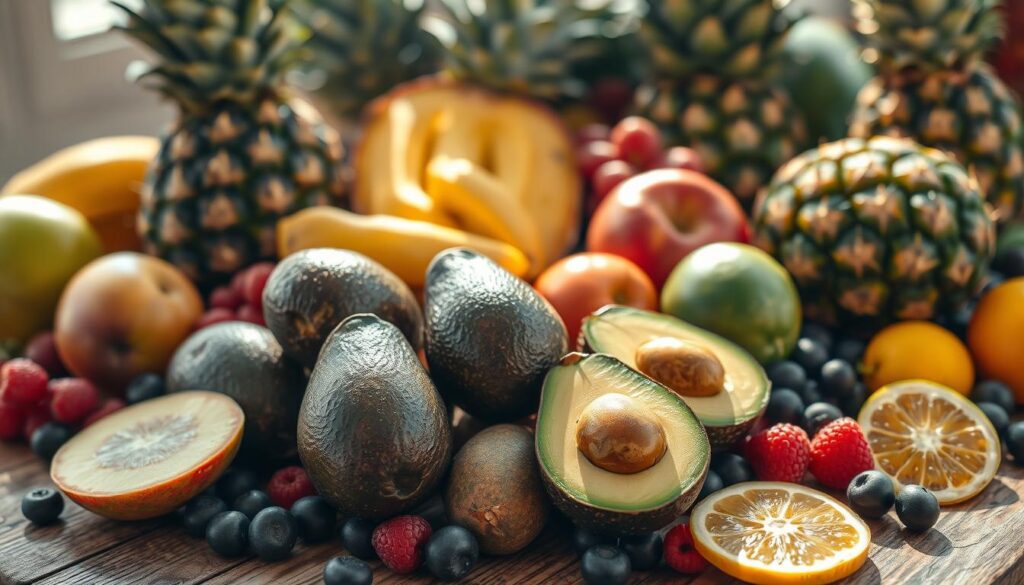Have you ever wondered why healthy diets often include avocados? This fruit is not just a trend but a nutrient powerhouse. It adds richness and flavor to meals, boosting your health.
Avocados are great for your heart and help with digestion. They also support bone and skin health. Adding avocados to your diet can lower the risk of chronic diseases.
Avocados are not only good for you but also easy to use in cooking. They help with weight management and give you more energy. Plus, they make fat-soluble nutrients easier to absorb.
Key Takeaways
- Avocados are loaded with healthy fats, aiding in heart health.
- Rich in fiber, avocados support proper digestion.
- This fruit provides essential vitamins, enriching bone and skin health.
- Incorporating avocados into your diet may help reduce the risk of chronic diseases.
- Avocados are not only nutritious but also versatile in culinary applications.
- A diet including avocados can contribute to weight management and increased energy.
- Avocado consumption can enhance the absorption of fat-soluble nutrients.
Introduction to Avocado
Avocados, known as Persea americana, are not just tasty; they’re also packed with health benefits. They come from Mexico and are now grown in the U.S., mainly in California. Their creamy texture and rich taste make them perfect for dishes like guacamole, salads, and tacos.
Avocados offer more than just great taste. They’re full of nutrients and healthy fats that help your heart and digestion. Studies show eating avocados can improve your health, thanks to their vitamins and minerals.
Avocados are good for your heart because of their healthy fats like oleic acid. They also help with digestion because of their high fiber. Plus, they have vitamins like K, C, and folate that are good for your bones and mood.
Adding avocados to your meals can bring many health benefits. They’re great on toast, in smoothies, or eaten fresh. Their versatility makes them a tasty way to improve your health.
| Nutrient | Per 100 grams of Avocado |
|---|---|
| Potassium | 485 mg |
| Folate | 81 µg |
| Vitamin B6 | 0.257 mg |
| Vitamin C | 10 mg |
| Vitamin E | 2.07 mg |
Health Benefits of Avocado

Avocados are packed with health benefits for the body. Adding them to your diet can boost your overall health. They offer many benefits that improve your well-being.
Promotes Heart Health
Avocados are great for your heart. They are full of healthy fats like oleic acid. These fats can lower bad cholesterol and raise good cholesterol.
This helps protect your heart and lowers the risk of heart disease.
Aids Digestion
Avocados are rich in dietary fiber, which is good for digestion. A medium avocado has about 10 grams of fiber. This helps keep your bowel movements regular and prevents constipation.
This fiber also helps your body absorb nutrients from other foods.
Supports Nutritional Needs
Avocados are a nutritional powerhouse. They are full of vitamins and minerals. A single avocado gives you 40% of the Daily Value of folate and 30% of vitamin K.
They also have over 20% of vitamin C. Plus, they have potassium and magnesium, important for blood pressure and muscle function.
Avocado Nutrition Facts
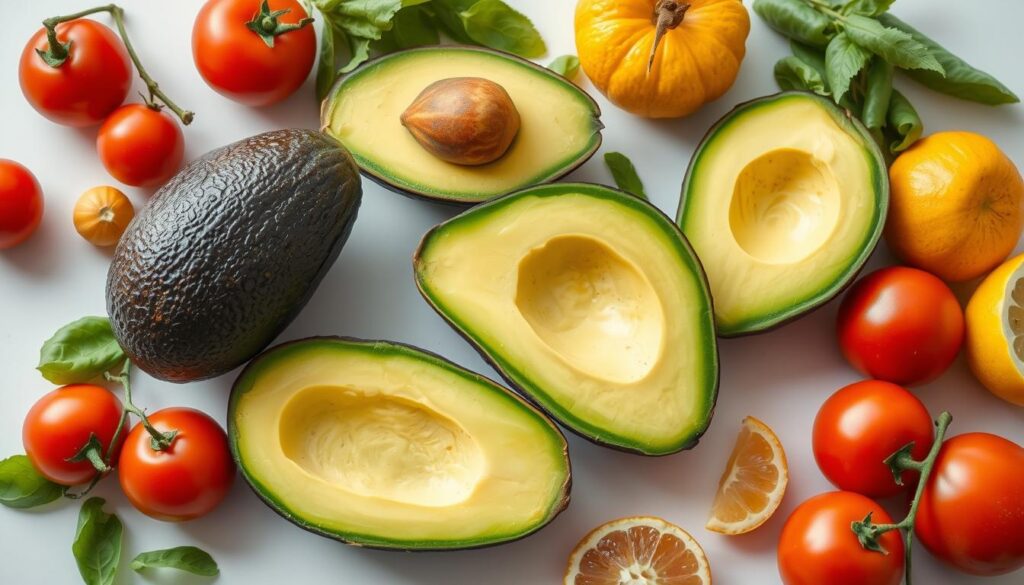
Learning about avocado nutrition facts shows us why avocados are so good for us. They are full of vitamins, minerals, and healthy fats. All these nutrients are packed into a tasty fruit.
Vitamins and Minerals
Avocados have nearly 20 vitamins and minerals. A serving gives you:
- Folate: 45 mcg DFE, about 10% of the daily value.
- Potassium: 250 mg, important for nerves and heart, with 6% of the daily value.
- Vitamin K: 10% of the daily value per serving, helping with blood clotting and bones.
- Vitamin C: 4% of the daily value, boosting the immune system.
- Lutein: 136 micrograms, good for eye health.
Caloric Content
A third of a medium avocado (about 50g) has 80 calories. This makes it a low-calorie choice compared to bananas or potatoes. A whole avocado has about 240 calories, depending on its size. Avocados are also heart-healthy, with no cholesterol, 0g of sugar, and 0g of sodium.
Healthy Fats and Fiber
Avocados are full of healthy fats, with 6g of good fat per 50g serving. They have monounsaturated fats that don’t raise bad cholesterol. They also have 3g of fiber per serving, which is 11% of the daily value. These qualities make avocados not only tasty but also very nutritious.
| Nutritional Component | Amount per 50g Serving | Daily Value % |
|---|---|---|
| Calories | 80 | N/A |
| Total Fat | 6g | N/A |
| Saturated Fat | 1g | 5% |
| Dietary Fiber | 3g | 11% |
| Potassium | 250mg | 6% |
| Folate | 45mcg DFE | 10% |
| Vitamin K | 21mcg | 10% |
| Vitamin C | 10mg | 4% |
| Lutein | 136mcg | N/A |
Adding avocados to your meals is a simple way to improve your health and wellness.
Avocado, Delicious Fruits Full of Benefits
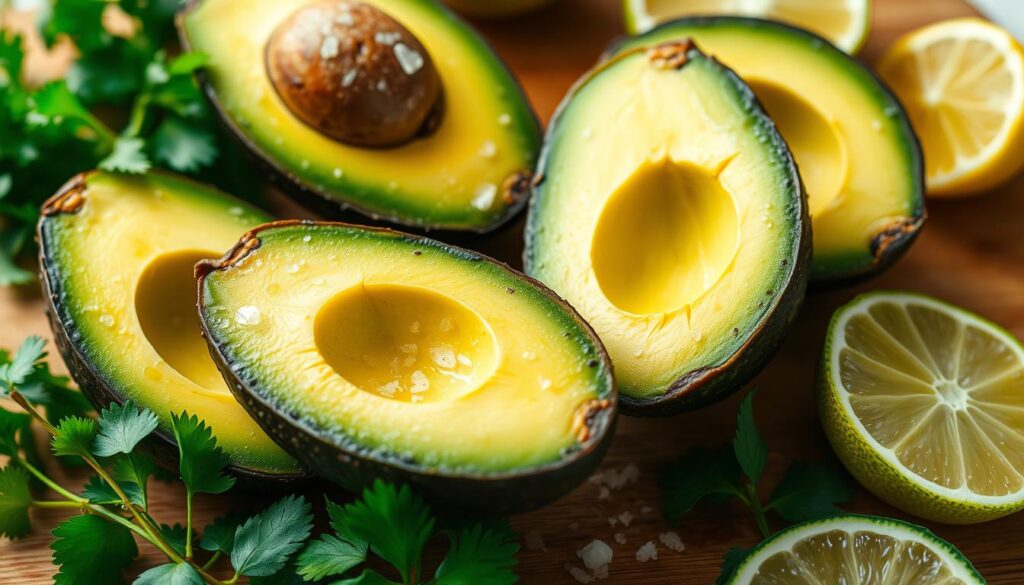
Avocados are known for their creamy texture and rich flavor. They are also packed with nutrients that boost heart health and improve insulin sensitivity. Eating avocados regularly can bring many delicious benefits of avocado, making them a great choice for your diet.
People love avocados for their amazing taste. They are a versatile ingredient that can be used in many dishes. Whether in smoothies, on toast, or in salads, avocados add flavor and satisfaction. They also support healthy digestion with their high fiber content.
Avocados are rich in calories and fat, but most of it is good for your heart. They also have potassium, magnesium, and folate, which are essential for your health.
Here are some nutrition facts for a quarter of an avocado:
| Nutrient | Amount | Daily Value (%) |
|---|---|---|
| Calories | 80 | – |
| Total Fat | 7g | 9% |
| Saturated Fat | 1g | 5% |
| Cholesterol | 0mg | 0% |
| Sodium | 4mg | 0% |
| Total Carbohydrates | 4g | 2% |
| Dietary Fiber | 3g | 12% |
| Protein | 1g | 2% |
| Potassium | 244mg | 5% |
Adding avocados to your meals can open up new culinary possibilities. They offer health benefits that are hard to ignore. From simple snacks to complex dishes, avocados can make your meals more enjoyable and nutritious.
How to Incorporate Avocado into Your Diet
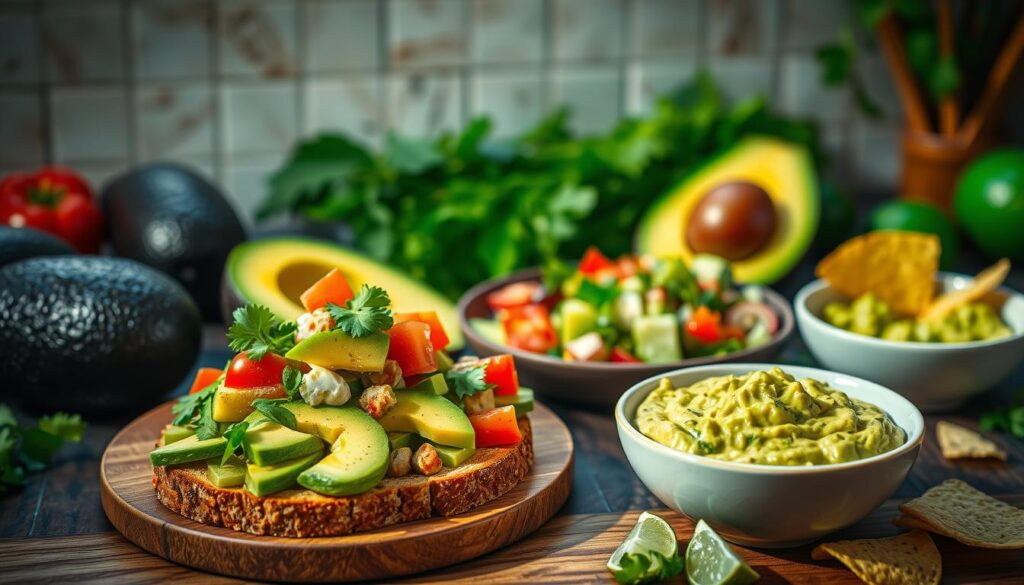
Adding healthy avocados to your meals can make them both nutritious and tasty. This versatile fruit can transform your diet in many ways. From smoothies to spreads, avocados offer endless options to make your meals enjoyable and healthy.
Nutritious Recipes
Looking for ways to add avocados to your meals? Here are some creative ideas:
- Avocado Toast: Mash ripe avocado on whole-grain bread and top with sliced tomatoes or poached eggs.
- Guacamole: Make a classic guacamole with fresh lime juice, diced tomatoes, and cilantro for a tasty dip.
- Avocado Smoothie: Blend avocado with spinach, banana, and yogurt for a creamy, nutritious drink.
- Pancakes: Add mashed avocado to pancake batter for a unique twist and extra nutrients.
- Desserts: Create mousse or ice cream with ripe avocados for a delicious, lower-calorie treat.
Common Uses in Meals
Avocados are more than just for basic recipes. Here are some common ways to enjoy them:
- Salads: Diced or sliced avocados add healthy fats and creaminess to salads.
- Sandwiches: Use mashed avocado instead of mayonnaise for a healthier option.
- Soups: Top soups with avocado slices for added texture and nutrition.
- Wraps and Tacos: Use avocado as a filling for wraps, sandwiches, or taco toppings.
- Snacks: Serve avocado halves with olive oil, salt, and pepper for a simple yet satisfying snack.
Avocados can also replace unhealthy ingredients in baking, making your dishes healthier. By exploring their versatility, you can easily add avocados to your daily meals. This will greatly improve your dietary habits.
| Preparation Method | Key Ingredients | Health Benefits |
|---|---|---|
| Avocado Toast | Whole-grain bread, avocado | Rich in healthy fats and fiber |
| Guacamole | Avocado, lime, tomatoes | High in vitamins and a great dip |
| Smoothies | Avocado, fruits, yogurt | Boosts nutrition and hydration |
| Pancakes | Avocado, flour, eggs | Increases nutrient content |
| Desserts | Avocado, cocoa, sweetener | Lower-calorie options with added nutrients |
The Role of Avocado in Weight Management
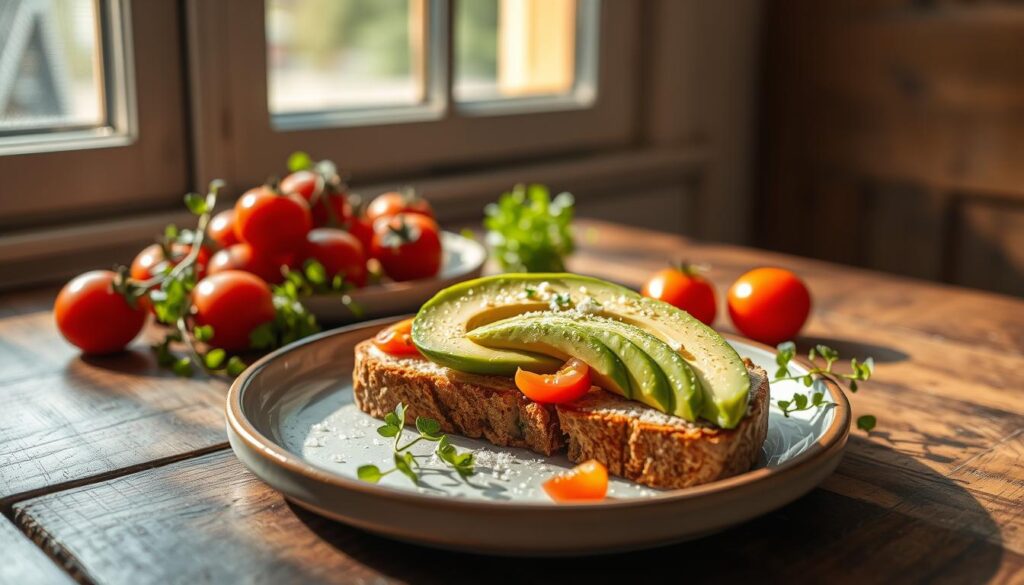
Adding avocados to your meals can help with weight control. They are tasty and full of nutrients that offer many health benefits. Eating avocados in the morning can help you feel full and control your hunger all day.
Satiating Properties
Avocados’ creamy texture can help control your appetite. They have about 6 grams of healthy fats and 3 grams of fiber. This makes you feel full for longer.
A study found that eating a whole avocado for breakfast reduced hunger and improved meal satisfaction. This could lead to eating fewer calories later in the day.
Appetite Regulation
Research shows that eating avocados regularly can prevent weight gain. People who eat avocados are 33% less likely to be overweight. They also have a 32% lower risk of having a big waist.
The fats in avocados help control blood sugar levels. This aids in controlling hunger and keeping energy stable.
Avocados do more than just make you feel full. They can also help reduce belly fat in women, according to a study. Avocados boost gut health with their high fiber content. This helps with weight control and overall health.
| Nutritional Component | Amount per Serving (1 Avocado) |
|---|---|
| Calories | 322 |
| Total Carbohydrates | 17 g |
| Dietary Fiber | 14 g |
| Protein | 4 g |
| Total Fat | 30 g |
| Monounsaturated Fat | 5 g |
| Saturated Fat | 4 g |
Adding avocados to your diet can help you stay healthy and enjoy tasty meals. Try starting your day with avocados to see their benefits for yourself.
Avocado and Diabetes
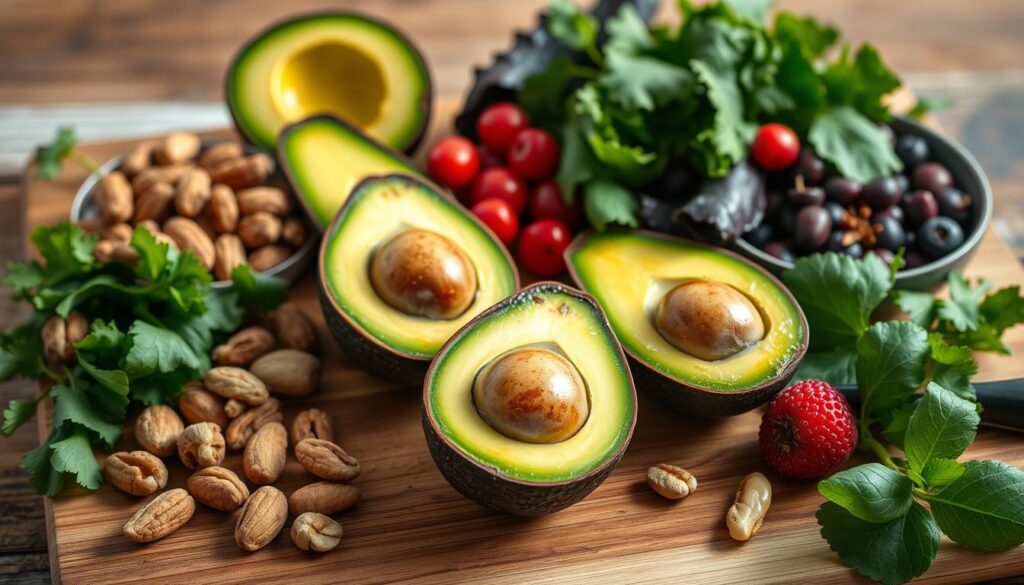
Adding avocados to your diet can help manage diabetes. They are full of healthy fats and fiber. These nutrients help control blood sugar levels.
Regularly eating avocados can also improve your nutrition. This might lower the risk of diabetes-related problems.
Blood Sugar Regulation
Avocados can positively affect blood sugar levels. A ½ small avocado has about 5.9 grams of carbs and 4.6 grams of fiber. This fiber is key, as it helps meet daily needs.
For women and men under 50, the daily fiber goal is 25 and 38 grams, respectively. Eating avocados can help lower blood sugar and A1C levels for those with type 2 diabetes.
Risk Factors Reduction
Eating avocados can also reduce diabetes risk factors. Studies show that adding half an avocado to meals boosts satisfaction by 26% and reduces hunger by 40%.
The monounsaturated fats in avocados can improve insulin sensitivity. This is good for those with insulin resistance. People who eat avocados tend to have better nutrition, lower weight, and less chance of metabolic syndrome.
| Food Item | Carbohydrates (grams) | Fiber (grams) | Calories | Sugar (grams) |
|---|---|---|---|---|
| ½ Small Avocado | 5.9 | 4.6 | 120 | 0.2 |
| 1 Cup Avocado Cubes (150g) | 12.79 | 10.1 | 240 | 0.9 |
| 150g Raw Apple | 19.4 | 3.3 | 77 | 15.6 |
| 150g Raw Banana | 34.26 | 3.1 | 89 | 18.34 |
Benefits of Avocado for Skin and Hair
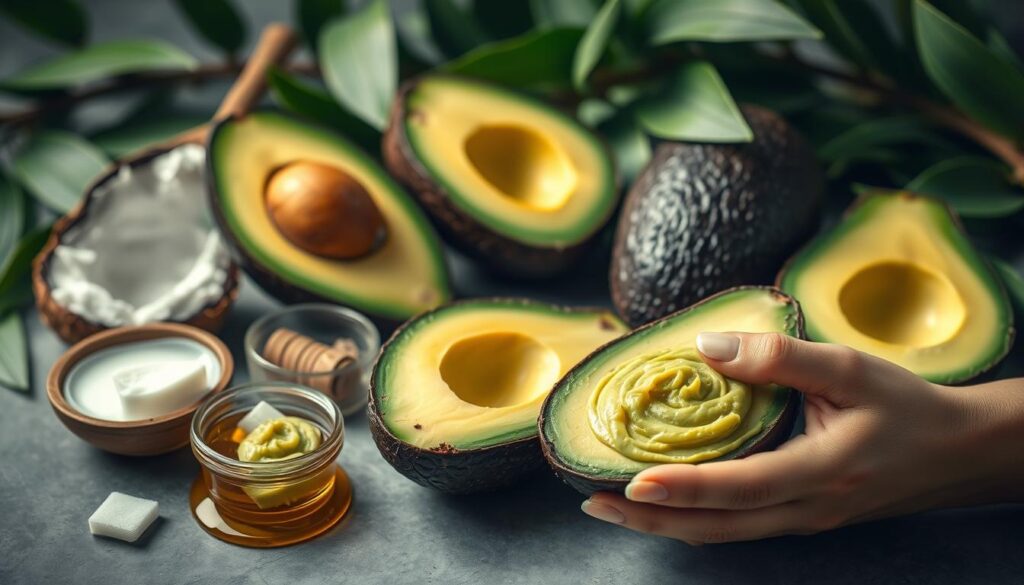
Avocados are not just tasty but also great for your skin and hair. They are full of vitamins and healthy fats. This makes them perfect for improving your beauty.
Avocados have nearly 20 vitamins and minerals. Vitamins E and C help make collagen and keep your skin healthy. They make your skin look better and feel more alive.
Nourishing Properties
Avocado oil is amazing for your skin. It keeps your skin hydrated, reduces inflammation, and removes dead skin cells. Biotin in avocados helps prevent dry skin.
When you use avocado oil on your skin and hair, it moisturizes well. This makes your skin and hair feel soft and look great.
- Avocados are full of healthy fats, which makes your skin elastic.
- Avocado oil’s antimicrobial properties can reduce acne.
- Studies show avocado compounds protect against sun damage.
- Using avocados regularly can make your skin look and feel better.
Anti-Aging Effects
Avocados are great for fighting aging. They have monounsaturated fats that improve skin elasticity and reduce wrinkles. An avocado hair mask can also make your hair soft and prevent breakage.
| Hair Mask Recipe | Ingredients | Benefits |
|---|---|---|
| Avocado-Cider Hair Mask | 1 ripe avocado, 1 tbsp olive oil, 1 tbsp apple cider vinegar, 1 tbsp brown sugar | Hydrates hair, adds shine, and combats dryness |
| Emergency Hair Repair Mask | 1 ripe avocado, 1 tbsp honey, 1 tbsp coconut oil | Restores damaged hair and enhances moisture |
| Degreaser Mask | 1 ripe avocado, 1 tbsp yogurt, 1 tbsp lemon juice | Controls oiliness and nourishes scalp |
| Moisture Treatment | 1 ripe avocado, 2 tbsp almond oil | Intensive hydration and softness |
Always do a patch test before using avocados or their oil on your face or hair. This ensures you won’t have any bad reactions. Using avocados can help you look and feel younger.
The Unique Origin of Avocado

Avocados have a rich history, starting in Mexico and Central America. They’ve been grown for about 5,000 years. This is around the time the wheel was invented, showing how important they were to ancient people.
Mesoamerican tribes first grew avocados, spreading them to many cultures. A site in Puebla, Mexico, shows they were eaten 10,000 years ago. The Aztecs and Maya used them a lot, making them a key food.
In 1833, avocados came to the U.S. They quickly grew in California, Florida, and Hawaii. At first, they were popular, but a dip in the 1980s followed. But, as people learned about their health benefits, they became popular again.
Avocados also went to Europe in the 16th century, thanks to Spanish explorers. Now, 79 percent of Mexico’s avocado exports go to the U.S. This shows how big they are in food and economy.
| Key Milestones | Date/Percentage |
|---|---|
| First Avocado Cultivation | 5,000 years ago |
| Introduction to the U.S. | 1833 |
| U.S. Consumption Turnaround | 1980s |
| Mexican Avocados to the U.S. | 79% |
Learning about avocados’ history makes eating them even more special. Their story is not just about taste but also about culture and history. Every time you eat an avocado, you connect with thousands of years of history.
Avocado Recipes for Every Meal
Avocados make any meal better. They add flavor to breakfast, lunch, dinner, and even desserts. Here are some tasty avocado recipes to try.
Breakfast Ideas
Begin your day with avocado recipes that boost your energy. Try these:
- Avocado Toast with Poached Eggs: A mix of creamy avocado and poached eggs on whole-grain toast.
- Bacon and Avocado Eggs: A filling breakfast with bacon and avocado, packed with 233 calories, 19g fat, and 12g protein.
- Avocado Smoothie: Blend avocado, banana, and yogurt for a creamy, nutritious smoothie.
Lunch and Dinner Recipes
For lunch and dinner, avocado salads or main dishes are both tasty and healthy. Here are some ideas:
- Hearty Avocado Crab Boats: Avocado halves filled with crab meat, with 325 calories, 28g fat, and 13g protein.
- Fish with Avocado Salsa: Fish fillets paired with a zesty avocado salsa, totaling 376 calories and 28g protein.
- Chicken Skewers with Cool Avocado Sauce: Grilled chicken skewers with creamy avocado sauce, just 59 calories per skewer.
Sweet Treats
Avocados can make desserts healthier without losing flavor. Try these avocado desserts:
- Avocado Chocolate Mousse: A creamy dessert made with avocado and cocoa powder.
- Avocado Pudding: Blend ripe avocados with honey or agave nectar for a healthy pudding.
- Avocado Brownies: Make fudgy brownies with ripe avocados for a nutritious treat.
These avocado recipes show how versatile avocados are. Adding them to your meals can improve your health and taste buds.
| Recipe | Calories | Fat (g) | Protein (g) |
|---|---|---|---|
| Bacon and Avocado Eggs | 233 | 19 | 12 |
| Avocado Crab Boats | 325 | 28 | 13 |
| Fish with Avocado Salsa | 376 | 22 | 28 |
| Chicken Skewers with Cool Avocado Sauce | 59 | 3 | 6 |
With these creative and delicious avocado recipes, you’ll find endless ways to enjoy this nutrient-rich fruit in your meals.
Understanding the Risks of Avocado Consumption
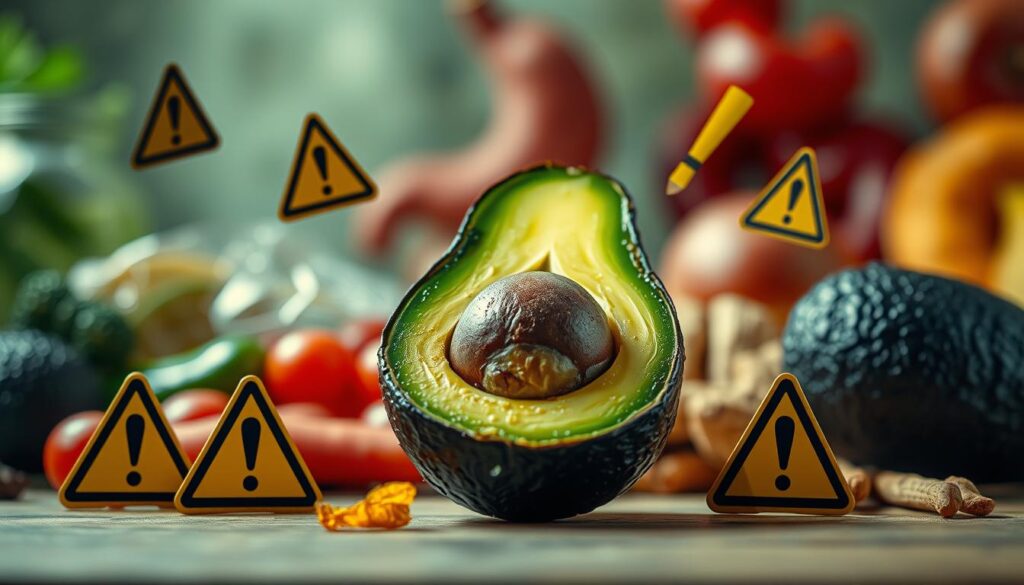
Avocados are packed with health benefits, but eating too much can be risky. They are full of healthy fats, which are good for your heart. But, they also have a lot of calories, which can cause weight gain if you eat too many.
If you take blood thinners, be careful with avocados. They have vitamin K, which can make your medication less effective. Eating avocados in small amounts is safer.
One avocado has about 21 grams of healthy fats. This makes it a great choice for your diet, but only if you eat it in moderation. Knowing the risks helps you enjoy avocados without harming your health.
Conclusion
Adding avocados to your daily meals brings many health benefits. They are packed with vitamins like C, E, and K. They also have healthy fats and fiber. These nutrients help keep your heart healthy, improve digestion, and make your skin glow.
Avocados are not just tasty; they’re also key to a balanced diet. By adding them to your food, you can try out many recipes. You can make smoothies, salads, or spreads with them.
Trying new recipes keeps your meals interesting. It also helps you get the most health benefits from avocados. Whether you want to lose weight or strengthen your bones, avocados can help.
Make avocados a regular part of your meals. Enjoy their taste and the health benefits they bring. They’re a great addition to any kitchen.

